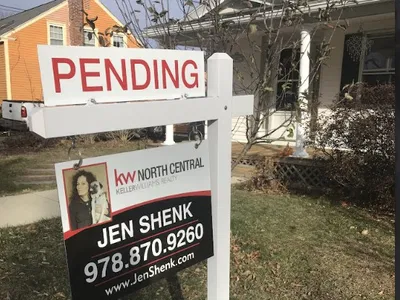
Since the state of the overall real estate market, both here and across the US, is basically unchanged from my last few articles (high interest rates, lack of homes for sale, and prices up in our area of the East and down on the West coast), rather than be redundant, I’ll give buyers and sellers some realistic reasons for optimism in our weird market.
Buyers: If you are looking to buy a home in Central Massachusetts, but are frustrated because there are so few homes on the market, here are some thoughts on how to find a new home.
At a high level, people decide to sell their homes for two reasons: they have to sell, or they want to sell. Our current market discourages people who want to sell (because the sellers lose their great interest rate, and often need to buy another place to live at today’s rates), but if you must sell, now is a good time to do it from a financial viewpoint. These ‘must be sold’ homes are the homes that will come on the market the most in today’s market. What you won’t see as much of, for instance, is people who want to downsize, since the monthly cost of a smaller home might very well be more than that on the already owned larger home. For this reason, we’ll deal with people who must sell, which is where the opportunities are.
People have to sell for a number of reasons:
Divorce: this is unfortunately a major reason to sell a house, and since most divorces are not particularly amicable, people in this situation will often sell their homes regardless of where they then have to live next, based on the theory that anywhere is better than here.
An inherited house: This is more common than expected, but a lot of homes going on the market are homes where someone has died (not necessarily in the house), and the heirs or trustees have to sell the home so as to divide up the inheritance. In these cases, the ‘sellers’ sometimes don’t have an emotional connection to the property because they’ve never lived there, plus the personal representative or trustee of the estate is eager to sell and get it done. Oftentimes the home is vacant, with carrying costs, and importantly, no heirs get any inheritance until the house (generally the largest asset) is sold.
Assisted Living: Homes owned by elderly people who must move to assisted living of some sort. It’s unfortunate, but sometimes people can no longer maintain their homes, or need around the clock access to medical care. These assisted living places are quite expensive, which generally means people moving there must sell their current homes.
Work Transfers: These can be either voluntary or involuntary. If you are transferred to a new corporate office in Orlando, for instance, you must move or find another job. In these cases the company demanding the relocation will probably help with the cost of the relocation, so as to not lose the employee. In the voluntary case–you just were offered a much better job, but it’s somewhere else, you’ll have to do the math to see if it is worth it. Regardless, you’ll almost always need to sell your current home.
So how does the above help someone searching for a home in Central Massachusetts? Well first, it shows that there will always be homes for sale regardless of the macroeconomic environment, but more importantly it offers a strategy.
In many of the cases above, the homes may not be in the best shape. In the case of a divorce, it’s a safe bet things haven’t been going well for awhile, and in that type of an environment, no one is doing a lot of work to keep the mutual house in tip top shape. In the case of a home where the owners are moving to assisted living, or have passed away, they very well might not have been physically capable of keeping the lawn mowed, the house clean, and maintaining the property.
These cases are different from a home that’s in terrible shape for some other reason–it was a rental and was trashed, the home is bank owned and the prior owners just walked away and abandoned it, etc. In these cases, fixing the house up could be a major undertaking, and particularly in a bank’s case, they aren’t very motivated to sell.
What’s different about homes in the list above versus bank owned, is that these homes haven’t been just sitting around for a long period of time, vacant, and more importantly, they very well might be in great locations, allowing a purchaser to come in, get the house for a reasonable amount, fix it up, and all of a sudden you have a nice house in a great location. Even more importantly, the major goal of the sellers of these homes is almost always the speed of the sale, sometimes more so than a high price. Consider this: if you are handling an inheritance, the proceeds will often be split amongst several people (diluting the effect of a higher sale price), and no one gets anything until the place sells.
In the case of some assisted living places, the facility takes all the assets in to account, so the sale price is sometimes a minor consideration . In the case of divorce, getting away from each other might far outweigh the value of a high sale price. And, in every one of these cases, for every month the house sits vacant, there are large carrying costs like taxes, heating, water, vacant house insurance, possibly a mortgage payment, etc. This really argues for a fast sale.
In the case of homes such as discussed above, it’s very important to work with a real estate agent who is experienced in these types of sales, whether buying or selling, because these type of situations, especially ones involving estates, law firms, heirs, and elderly people, can have all sorts of twists, from family squabbles to houses where hoarding has occurred.
However, since there is such a shortage of listings, buyers still need to be as competitive as possible in their strategy, because the sheer number of buyers ready to purchase will drive the sale price up. My team has several buyer strategy points that we encourage our clients to consider–and they aren’t always about a higher offer price.
For Sellers, the advice is the same as last month. There is a serious shortage of homes for sale here in Central Massachusetts, so despite high interest rates, there will be interest in your property (assuming competent marketing and pricing), so hire a good, experienced agent.



